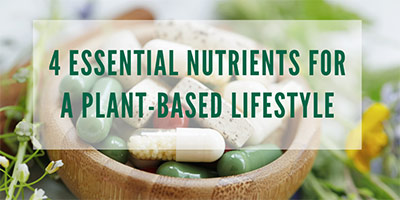Shifting to a plant-based diet is more than a fad or a trend; it is a lifestyle! Years of research have found that eating more plants is good for health and longevity, and a healthier planet. However, to create any new habit, the initial transition can feel challenging and maybe even a culture shock. The good news is, a little education and preparation on best practices of creating a plant-based life can set you up for success. This month I'm sharing essentials for a healthy and sustainable plant-based lifestyle! Are you already following a plant-based lifestyle? I'd love to hear your favorite tip to share with others.
-Stephanie |
|
|
5 Essentials for a Plant-Based Lifestyle
|
1. Embrace the Variety of All the Foods You Can Eat!
Consuming an assortment of foods will help to ensure that all of your nutrient needs are being met. The options are almost endless, there are so many amazing and nutritious plant-based foods available. Many people go wrong when attempting to create a sustainable plant-based diet because they do not eat enough food to sustain everyday function. Some important things to consider:
- Create the foundation with: whole-grains, fruits, vegetables, beans, peas, legumes, nuts, seeds, avocados, and coconut, and plant-based oils such as olive oil, avocado oil, and grapeseed oil.
- Experiment with different foods such as quinoa, tofu, tempeh, hemp seeds, chia seeds, flax seeds, seaweed, and fermented vegetables to create more intriguing meals in both flavor and texture!
- Take it slowly. When switching to a plant-based diet, do it gradually so that your stomach can adjust to your new diet's increased fiber intake.
- It is important to work with a registered dietitian when switching over to a plant-based diet to meet energy requirements.
2. Read the Food Label!
The food label found on the back of packages will tell you whether or not a food product is plant-based. Tips for identifying plant-based food items:
- At the bottom of the ingredients, there is a "contains:" section. This section serves as a short-cut for determining whether or not the product is plant-based. Still, it is always a good idea to double-check the ingredient list as well!
- Look for the "certified vegan" symbol, which is another time-saver for determining if there are any animal products or animal bi-products within that packaged food.
- If the ingredients listed contain any dairy, egg, or meat-derived ingredients - then it is not considered entirely "plant-based."
3. Prep in Advance.
Being prepared is critical because you'll never know what kind of options you will have at restaurants or convenience stores. One way to help ensure that you will consume enough food on a plant-based diet is to prepare meals ahead of time, always to have access to food when you get hungry!
- Pick 1-2 days of the week to research interesting plant-based recipes, shop for ingredients, and cook the food for the week.
- Investing in a spacious cooler bag or lunch box is also a great way to stay prepared. This way, you can pack your food to take with you when you are at work, school, etc.
4. Connect with Other Plant-Based People!
Community is such a crucial aspect of our lives. A support system of people who understand your reasonings for eating plant-based is a game-changer for success. There are many ways to connect with other plant-based people, such as:
- Joining a plant-based Facebook group
- Meet up with people in your area at a local restaurant that specializes in plant-based dining
- Start your own plant-based community! The simple act of creating a safe space to ask questions or express opinions and share common interests will be invaluable on your journey.
5. Don't Deprive Yourself.
There are so many plant-based "fun foods" out there now. You no longer have to compromise or miss out on your favorite foods that you may have grown up eating. There are now delicious plant-based ice creams, pizzas, burgers, candies, and more to try! These "fun foods" should be consumed in moderation but can be a great comfort, especially for newly plant-based individuals. There are also fantastic plant-based cookbooks that have re-created many traditionally non-plant-based recipes into (often even better tasting) plant-based versions!
|
|
|
4 Essential Nutrients for a Plant-Based Lifestyle
|
 |
- Iron: Good plant sources of iron include lentils, chickpeas, beans, tofu, cashew nuts, chia seeds, ground linseed, hemp seeds, pumpkin seeds, kale, dried apricots, figs, raisins, quinoa, and fortified breakfast cereal. However, it is essential to consider that there are lots of factors that affect the amount of iron your body can absorb from your diet. The amount needed for each individual depends on many factors.
- Vitamin D: One of the best ways to boost your vitamin D level is by getting 10 - 15 minutes a day of direct sunlight. Since it is not prevalent in many plant foods besides mushrooms or fortified soy milk, orange juice, and cereals, a vitamin D supplement may be necessary.
- Omega-3 fatty acids: Available in a wide variety of plant foods such as walnuts, flaxseeds, chia seeds, hemp seeds, edamame, seaweed, algae, and other green leafy vegetables. If you don't have access to these foods daily, consider a plant-based omega-3 supplement made from algae, hemp, or other omega-3 rich plant-based foods.
- Vitamin B12: B12 is a must for a healthy plant-based diet! Plant-based food sources of B12 are somewhat scarce, but there are some B12 fortified products such as non-dairy milk, cereals, and nutritional yeast that you can add to your diet. There are also many vegan B12 supplements out there that can be taken. Alternatively you can get a B12 shot.
Various factors will influence your need to take additional supplements. Always consult your physician and registered dietitian before starting any supplements.
|
|
Featured Recipe
Black Bean Street Tacos with Tropical Fruit Salsa
|
Makes 4 servings
Ingredients:
- 2 teaspoons cooking oil of choice
- ¼ cup diced red onion
- 1 15-ounce can black beans
- 1 teaspoon cumin
- 1 teaspoon chili powder
- 1 teaspoon tamari or soy sauce
- 2 cloves pressed garlic
- ⅓ cup diced pineapple
- ⅓ cup diced mango
- ¼ cup diced red bell pepper
- ¼ cup diced tomato
- ½ lime, zest and juice
- 1 minced jalapeno pepper, removed seeds and membranes if less heat preferred
- ¼ cup chopped fresh cilantro
- Salt
- 6 - 12 corn tortillas
Instructions:
Heat oil in a small saucepan. Add onion, beans, cumin, chili powder, soy sauce, and garlic. Cook over medium heat until hot, about 6-8 minutes.
Combine diced pineapple, mango, bell pepper, tomato, lime, jalapeno, cilantro, and salt in a medium sized mixing bowl; set aside.
Warm tortillas if desired and then lay flat for taco assembly. Use two tortillas per taco if desired. Top each tortilla with broccoli slaw, black beans, and fruit salsa, and enjoy immediately after assembly.
Source: Grateful Grazer from pulses.org
|
|
|
Be Inspired
|
|
“Life is too short to make others shorter.”
- Chris Hannah (Propagandhi)
|
|
|
About SO Nutrition
|
 Stephanie Leipprandt Ouellette, MBA, RDN, LD
Stephanie Leipprandt Ouellette, MBA, RDN, LD Stephanie has been working in the field of nutrition and dietetics since 1995. She earned a Bachelor of Science degree in Dietetics from Michigan State University, completed an Approved Pre-Professional Practice Program at Western Michigan University and earned a Master of Business Administration from Baker College. She’s been a Registered Dietitian Nutritionist since 1996 and licensed in Texas since 2007. In 2008, Stephanie earned her certification in Childhood and Adolescent Weight Management. Stephanie has extensive clinical & managerial experience, both in corporate settings and in the community. Now she wants to share her knowledge with you, because most (if not all) nutritional habits begin at home.
Stephanie and her family reside in Katy, Texas
|
|
| |
Copyright © 2021 Customized Nutrition Newsletters, All rights reserved.
|
|
| |
|
|